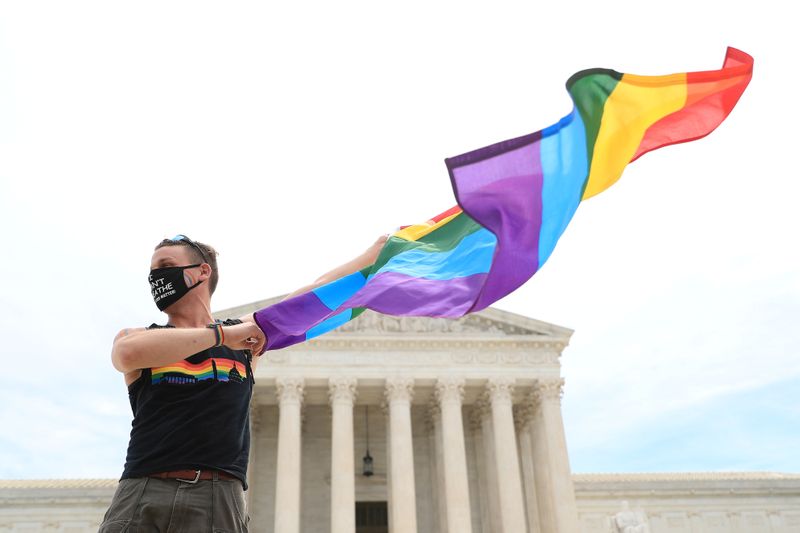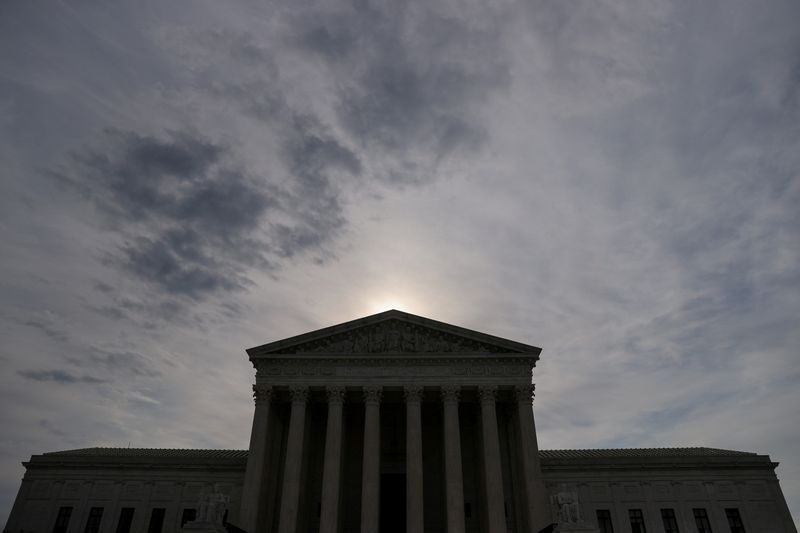By Lawrence Hurley and Jan Wolfe
WASHINGTON (Reuters) - The U.S. Supreme Court's ruling protecting LGBT rights in the workplace sets the stage for another major legal fight over the scope of religious-rights exemptions to certain federal laws that could dilute the landmark decision's impact.
The justices ruled 6-3 on Monday that federal employment law safeguards gay and transgender employees from discrimination but failed to resolve some related legal questions. One of them is whether the court, which has 5-4 conservative majority, will expand the ability of individuals, businesses and organizations to cite religious beliefs when contesting government actions such as enforcement of anti-discrimination laws.
In their next term, which starts in October, the justices will decide whether Philadelphia violated the U.S. Constitution's First Amendment rights of freedom of speech and religion in how it dealt with an organization that is part of the city's Roman Catholic archdiocese. City officials barred Catholic Social Services from participating in Philadelphia's foster-care program because the organization barred same-sex couples from serving as foster parents, a violation of its anti-discrimination policies.
A ruling in favor of Catholic Social Services could make it easier for people to cite religious beliefs when seeking exemptions from widely applicable laws, potentially even in employment cases.
"There are absolutely ways it could come out that would mean there's a constitutional right to discriminate," said American Civil Liberties Union lawyer James Esseks as the justices consider various options for deciding the dispute.
Catholic Social Services has asked the court to overturn a 1990 Supreme Court ruling in the case Employment Division v. Smith that limited such exemptions. Overturning that ruling "would open up a whole panoply of religious defenses," said John Bursch, a lawyer with the conservative Christian legal group Alliance Defending Freedom.
RELIGIOUS FREEDOM RESTORATION ACT
Even if the court does not do so, employers can still mount religious-based defenses under a 1993 federal law called the Religious Freedom Restoration Act.
R.G. and G.R. Harris Funeral Homes Inc of Detroit, one of the employers named in the discrimination cases the Supreme Court decided on Monday, had cited that law in its defense after a transgender former employee, Aimee Stephens, sued the company.
The Supreme Court did not decide the Religious Freedom Restoration Act issues. Justice Neil Gorsuch, the ruling's author, wrote that "how these doctrines protecting religious liberty interact with Title VII (the section of the civil rights law at issue) are questions for future cases."
Employers have a "pretty good start" in making a religious rights claim following a 2014 Supreme Court ruling that allowed that law to be invoked by companies, University of Miami School of Law constitutional law professor Caroline Mala Corbin said.
Beyond the religious rights issue, there is the question of whether other federal laws barring sex-based discrimination, including those involving bias in housing and education, should be interpreted as covering sexual orientation and gender identity. If so, that could affect the ongoing dispute over whether transgender students can be barred from using the bathroom that corresponds with their gender identity, as a Virginia school district did in a case pending in the lower courts.
The Supreme Court in recent years has sent mixed messages on the intersection between gay and religious rights. It backed gay rights in a series of rulings culminating in the 2015 decision legalizing same-sex marriage nationwide. But it also bolstered religious rights, including in the 2014 ruling allowing owners of businesses to raise religious objections against the government.
The justices in 2018 handed a victory on narrow grounds to a Colorado baker who refused based on his Christian beliefs to make a wedding cake for a gay couple, but stopped short of setting a major precedent letting people claim religious exemptions from anti-discrimination laws.
Central to those cases was conservative Justice Anthony Kennedy, who retired in 2018. President Donald Trump appointed Brett Kavanaugh to replace him. Kennedy wrote the gay marriage ruling, joining with the court's liberals, but joined with his fellow conservatives in the religious-rights and baker decisions.
Kavanaugh, like Gorsuch, has shown sympathy toward religious liberty claims. Kavanaugh dissented in Monday's ruling.

Bursch said there is a "strong possibility" that the 6-3 vote breakdown in Monday's ruling would not be replicated when the court decides the foster care case, with a ruling due by the end of June 2021.
